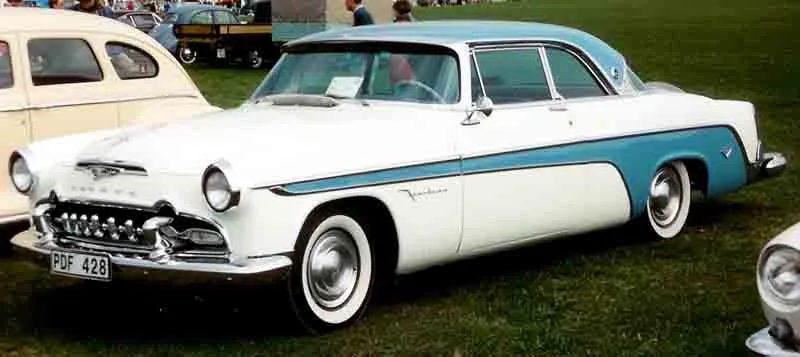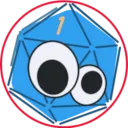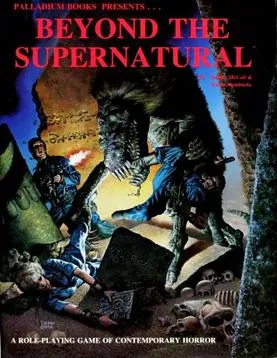Last week, I mentioned I was trying a new tabletop role-playing game. Well, "new" isn't quite the right word. It was Beyond the Supernatural from Palladium Press, first copyrighted in 1986 and released in 1987. This game is almost as old as I am.
The book opens with a disclaimer which states,
WARNING!
This game may contain subject matter, the supernatural, psychic powers, magic and monsters, which may not be appropriate for young readers.
The context of this Role-Playing Game book is fictional; make-believe. However, its detail and realistic portrayals may offend some and disturb others. Please NOTE that none of us at Palladium BooksⓇ condone nor encourage the occult or the use of magic.

This may seem odd now, but this was at the height of the Satanic Panic, people were blaming Dungeons & Dragons for everything from occult influence to teen suicide, and just a few years prior, the United States Senate had held hearings about "porn rock" and the alleged need to regulate the music industry and set it up as the scapegoat for all ills of society.
There are absolutely no parallels to any modern issues here. Nope.
Anyway, strange as it may sound today, role-playing games were seen as downright dangerous by much of the general public. The first portion of the book goes to great lengths to explain how everything is fictional, the events are imaginary, and the people/magic/monsters in game are not real. It seems absurd today, but in the context of the time, it does make sense.
Mechanics
This was released while the original Advanced Dungeons & Dragons was still around. Second Edition was barely in the works behind the scenes. It may come as a surprise when I say the mechanics here feel downright modern, but this is a solid system. The Palladium "Megaversal System" used here is basically the same as that from Rifts and the 1980s Robotech games.
Character creation is a bit fiddly, with some dice rolling for basic stats, some math and table reference for derived stats, some added points based on chosen skills, and so forth. I wouldn't say it's more difficult than modern Dungeons & Dragons 5th edition, but it requires a lot more scratch paper to calculate everything.
The eight character attributes:
- Intelligence Quotient (I.Q.): basically the same Intelligence function of most games.
- Mental Endurance (M.E.): reflects how well a character copes with stress, whether mundane or supernatural.
- Mental Affinity (M.A.): charm and charisma.
- Physical Strength (P.S.): what it says on the tin.
- Physical Prowess (P.P.): more like D&D Dexterity.
- Physical Endurance (P.E.): Similar to D&D Constitution, but also bears on carrying capacity and endurance.
- Physical Beauty (P.B.): again, what it says on the tin. Note that being good-looking doesn't always mean being good with people, and I like how interaction is split with M.A.
- Speed (Spd): how quickly your character can move around the world on foot. This has a lot more variability than the current D&D "every body moves up to 30 feet per round," and can really affect day-to-day pace on foot.
This game really likes initialisms. At any rate, once the attributes are set, hit points (H.P.) and S.D.C. (Structural Damage Capacity) are calculated.
S.D.C. is essentially a pool of bonus hit points representing the punishment your character can withstand before taking real damage.
Wearing armor also adds an Armor Rating (A.R.) which must be exceeded before any damage is applied to S.D.C. or H.P.
If a player character is reduced to 0 or fewer H.P., they fall unconscious, and if they take a negative value which exceeds their P.E., they are dead dead. Otherwise, if the rest of the party can render aid, they can survive. HP and SDC recover slowly over time, and can take days or even weeks in game to return to full capacity.
Skills are based on a percentile system. Higher numbers are better, and the objective is to roll under the given value. If the GM calls for a detect ambush roll, players with the skill roll percentile dice. If they roll above their skill percentage rating, they fail, and the bad guys (if present) get the drop on the party.
Our game did not feature any psychic powers, so I can't really comment on any of that. Combat, however, was found aplenty. The system uses standard polyhedral dice, but not quite the same way as Dungeons & Dragons. A d20 is rolled to hit a target, and on a success, a pool of damage dice is rolled for damage. This doesn't use THAC0 or DC, though; and characters in melee combat can attempt to dodge an attack which would otherwise hit. Characters can also get multiple attacks per turn depending on their attributes and skills. Turns feel more dynamic than D&D 5E's move-action-bonus action system.
Gameplay
This is a supernatural survival horror game. The game master section includes lots of advice about foreshadowing, building suspense, and maintaining the feeling of unease for the players. Most games are meant to take place in the then-present-day of the late 80s or early 90s, but our GM wanted a story set in 1959.
Clive "Spoke" Wilson is my character. He's a smart and slightly unprincipled mechanical genius with proficiency in cars and motorcycles. A greaser with Mensa-level intelligence. He was just passing through town on his way to scope out a deal on a Deuce Coupe when he was roped into a mystery. While getting gas for his '55 DeSoto Firedome, he saw an extraordinary number of missing person posters. And that's where he also met the other three characters in our game.

1955 DeSoto Firedome image credit
We stopped a cult that had been kidnapping campers and sacrificing them to a mysterious eldritch monster. Then we intervened when the government's secret research facility tore a hole in reality and accidentally (we hope) unleashed an invasion of extradimensional/alien/demonic monsters a few miles from where we went camping. Cold war space race paranoia played a role in secret desert facilities, but the government was engaged in more than mundane rocket science. And we did briefly get to use the new AR15, since the secret base was using the latest cutting-edge experimental weaponry all around.
Final Thoughts
I'm sure closer examination will bring to light all manner of not-politically-correct attitudes and descriptions for the Woke crowd to hate nowadays. There are occasional typos, and the layout is not very professional by modern standards. It's a bit opaque about how a lot of it is supposed to work in rpactice, really. But this was still the early days of RPGs. The core system is solid, and I had fun taking this game for a whirl. I'll be playing more for sure.
I still favor Genesys and its narrative dice system or Savage Worlds for pulp action scenarios, but if you want to play a horror RPG in a modern setting with fast-paced combat, this is a solid option. There is a second edition of Beyond the Supernatural if you prefer an updated book, and the original edition has been re-released in a fancy hardcover now if you don't want to scour the web for a tattered second-hand copy like I did.
Have you played any Palladium Press RPGs? What was your experience?

